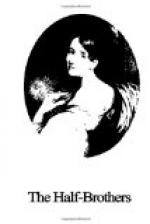night, till my aunt and the other watcher looked at
each other in dismay, and would fain have stopped her
if they had but known how. But she bade them
let her alone, and not be over-anxious, for every
drop she shed eased her brain, which had been in a
terrible state before for want of the power to cry.
She seemed after that to think of nothing but her
new little baby; she had hardly appeared to remember
either her husband or her little daughter that lay
dead in Brigham churchyard—at least so
aunt Fanny said, but she was a great talker, and my
mother was very silent by nature, and I think aunt
Fanny may have been mistaken in believing that my
mother never thought of her husband and child just
because she never spoke about them. Aunt Fanny
was older than my mother, and had a way of treating
her like a child; but, for all that, she was a kind,
warm-hearted creature, who thought more of her sister’s
welfare than she did of her own and it was on her bit
of money that they principally lived, and on what
the two could earn by working for the great Glasgow
sewing-merchants. But by-and-by my mother’s
eye-sight began to fail. It was not that she
was exactly blind, for she could see well enough to
guide herself about the house, and to do a good deal
of domestic work; but she could no longer do fine
sewing and earn money. It must have been with
the heavy crying she had had in her day, for she was
but a young creature at this time, and as pretty a
young woman, I have heard people say, as any on the
country side. She took it sadly to heart that
she could no longer gain anything towards the keep
of herself and her child. My aunt Fanny would
fain have persuaded her that she had enough to do
in managing their cottage and minding Gregory; but
my mother knew that they were pinched, and that aunt
Fanny herself had not as much to eat, even of the
commonest kind of food, as she could have done with;
and as for Gregory, he was not a strong lad, and needed,
not more food—for he always had enough,
whoever went short—but better nourishment,
and more flesh-meat. One day—it was
aunt Fanny who told me all this about my poor mother,
long after her death—as the sisters were
sitting together, aunt Fanny working, and my mother
hushing Gregory to sleep, William Preston, who was
afterwards my father, came in. He was reckoned
an old bachelor; I suppose he was long past forty,
and he was one of the wealthiest farmers thereabouts,
and had known my grandfather well, and my mother and
my aunt in their more prosperous days. He sat
down, and began to twirl his hat by way of being agreeable;
my aunt Fanny talked, and he listened and looked at
my mother. But he said very little, either on
that visit, or on many another that he paid before
he spoke out what had been the real purpose of his
calling so often all along, and from the very first
time he came to their house. One Sunday, however,
my aunt Fanny stayed away from church, and took care
of the child, and my mother went alone. When




